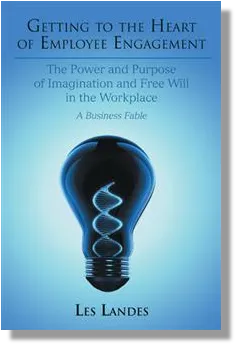
Systematic Continuous Improvement (SCI) Insights

The power and purpose of imagination and free will in the workplace

Brace yourself! I’m going to do something crazy for this week’s SCI blog – maybe even absurd given the short attention span that people have for reading anything substantive these days.
Below you'll find a passage from my book – Getting to the Heart of Employee Engagement. It goes to the very heart of the immense value and impact that can come from routine processes for engaging employees in systematic continuous improvement (SCI).
Hope you can make through to the end – I think you’ll enjoy it. 😊
“What do you think Barney’s big appeal is with kids? What does he talk about all the time that’s so captivating to them?” asked David.
“I can’t imagine,” said Tom.
“Yes, you can,” said David. “In fact, that’s the answer.”
“What’s the answer?” asked Tom.
“The answer to both questions—what’s different about human
beings, and why kids love Barney,” said David.
“You’re losing me, David,” said Tom with a puzzled look.
David smiled and said softly, almost with a tone of reverence, “It’s … imagination. Human beings are uniquely endowed with the capacity to create or process imaginary experiences. We have the gift to imagine things that never were and create things that have never been. All other animals basically take the world the way it comes. They can demonstrate tremendous intelligence—even use rudimentary tools. And they have most of the same basic needs that people do—for food, shelter, love, and affection. But all you have to do is look at something as simple as a pencil, and you realize that the source of almost everything distinctive that human beings have ever achieved is imagination.”
“Okay, so humans are like Barney—they have imagination,” said Tom with a touch of sarcasm. “Now, what does a purple dinosaur’s imagination have to do with employee engagement in a corporation
that employs twenty thousand people?”
“More than you think—but not more than you might imagine,” said David. “Let me ask you another question: How important is innovation to this company’s business strategy in the next few years?”
“It’s critical,” replied Tom. “And I get your point. Without imagination, it’s hard to have innovation, right?”
“Yeah, that’s pretty obvious, isn’t it?” said David. “But that’s only half the story. Imagination only provides the spark for innovation. It takes more than that to get a real fire started. Any idea what that is?” “Well, you need people to take action on the ideas that their imaginations generate,” said Tom.
“That’s right,” said David. “Otherwise you’ve got a bunch of ideas with no place to go. Now what does it take for people to get into action?”
“Lots of things,” replied Tom. “They need direction and resources; support and encouragement are important, too.”
“You’re heading down the right path,” said David. “But there’s something else that comes into play first—something else about people that sets them apart from other animals.” “I’m not sure,” said Tom. “Does it have something to do with motivation?”
“You’re close,” said David. “Do something for me. Finish this phrase: free as a …”
“Bird,” Tom replied quickly. “It never fails. I always get the same answer from people,” said
David. “Now let me ask you this. What is a bird free to do?”
“Just about anything it wants to do, I guess,” replied Tom.
“Are you sure?” David asked with a smile.
“Well, I was until you asked the question,” Tom replied, chuckling.
“The truth is, a bird is only free to do one thing, and that’s to do what birds are designed to do,” said David. “It may look like they’re flying around free to do whatever they want, but they’re actually programmed to do what they have to do—hunt for food, build nests, and make baby birds. That’s basically it.”
“I think they’re also programmed to leave their droppings all over my car,” said Tom with a smile. “Trust me,” said David. “They’re not picking on you. They unload on all of us once in a while. But it’s nothing personal. They’re just responding to nature’s call, and that’s an important difference between people and other animals. People can make choices—choices that may or may not be in tune with the natural order of things. And they’re able to do that because of one thing—free will.”
“I think I know where you’re heading,” said Tom. “If people don’t feel free to act on their imaginations, you won’t get innovation, right?” “Sounds simple,” said David. “But here’s something very important
about imagination and free will that a lot of people don’t think about: one without the other is useless.”
“How’s that?”
“Think about it, Tom,” replied David. “Free will without imagination has no purpose. Imagination without free will has no power.”
Tom was speechless as he reflected on what David had just said. Was that the elemental truth that he had been searching for?
“That’s a powerful idea,” Tom said finally after a moment of silence. “I’m struck by how something so simple can be so profound. It makes you realize just how vital it is to give people the space they need to be … well … people.”
“It actually goes deeper than that,” said David. “If you don’t give people room to maneuver, if you don’t give them the freedom to take initiative, you’ll not only restrict their free will, you’ll eventually snuff
out their imagination, too. They’ll hang up their brains on the coat rack when they walk into work—and they’ll pick them up again when they leave at the end of the day. It’s just too frustrating for people to have their imaginations churning all day if they have no place to go with the ideas they generate. So they just put their imaginations in park, and once they do, it can be mighty difficult to get them moving again. And, of course, it’s their choice to do that if they want.”
End of story! (Want more? Download the whole e-book for free!)
Click on the link below if you’d like to learn about some processes and tools for getting the most from your team’s uniquely human gifts of imagination and free will.
Schedule a free 30-minute discovery call
BONUS: When you sign-up for a call, you’ll get a step-by-step description of the Continuous Improvement Team Huddle.
Better ever after!
When you sign up for weekly SCI Insights
you'll instantly receive a FREE e-book:
Getting to the Heart of Employee Engagement
Are you looking for ways to get more CONSISTENCY, PRODUCTIVITY, PROFITABILITY, ENGAGEMENT, and INNOVATION in your business – Without the burden of wholescale culture change?
Come here for weekly inspiration and you'll find valuable tips and insights on how to get everyone on your team engaged in using easy-to-implement tools and processes with proven results for Systematic Continuous Improvement.
Better yet … just type your name and e-mail below, and you will get the SCI messages direct to your email every Monday.

Ready to invest some time into systematic continuous improvement?
Give us a call at 314-664-6497
or send us an e-mail,
and we’ll show you how to get employees tuned in,
turned on and eager to go above and beyond.
